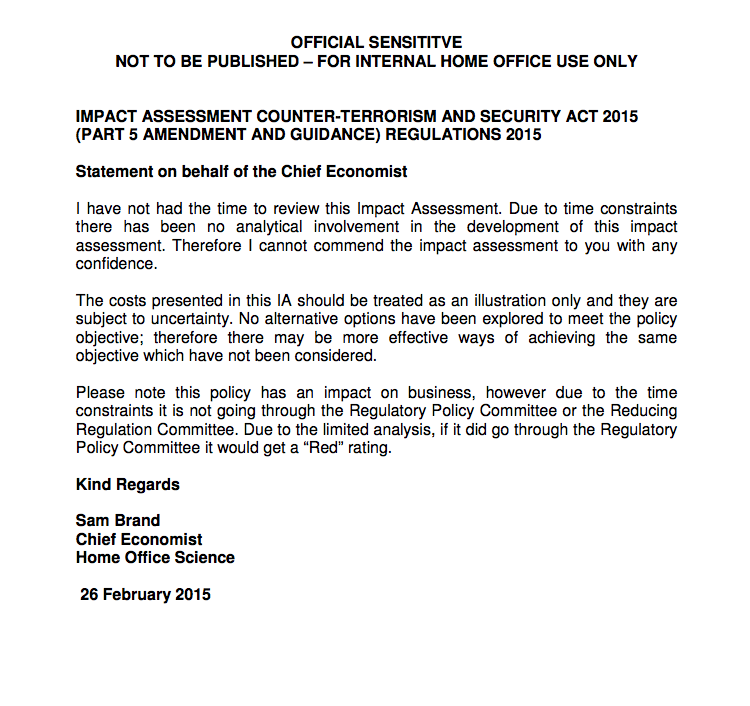
Anti-terror legislation that compels staff at Scottish institutions to recognise and alert authorities about potential terrorists has not been checked to see whether the money spent will be worthwhile.
The Home Office's chief economist, Sam Brand, warned in an impact assessment that he had not been given the time to properly evaluate the amendment to the Prevent strategy. The amendment applied to only Scottish authorities.
The impact assessment, published on the Home Office website, specifically refers to Part 5 of the Counter Terrorism and Security Act 2015, also known as Prevent, a counter-terrorism measure meant to deter Britons from getting involved in terrorist activity. More specifically, the impact assessment looked at applying the Prevent duty to Scottish authorities.
The £40 million Prevent programme is one of four "prongs" of Contest, the government's overall counter-terrorism strategy.
The document, seen by BuzzFeed News, also undermines the amendment by suggesting that "there may be more effective ways of achieving the same objective which have not been considered".
The document shows that there were only two options: Either to add Scottish bodies or not to add Scottish bodies to the programme.
The full counter terror Bill was rushed through after the country's threat level was increased from substantial to severe in August last year, with the draft published in November and the bill becoming law last month.
The new law compels a range of bodies to take part in the Prevent strategy. Guidance published yesterday shows that staff at institutions such as hospitals, universities, and nurseries will have a duty to recognise if a patient or student "is being drawn into terrorism" and to sound the alarm. It also gives new powers to police. The amendment in question means Scottish organisations also had a duty to report anyone suspicion to the relevant authorities.
However, the Home Office's chief economist said he was given no time to analyse the amendment, which means it has been passed into law despite a lack of evidence that it will prove effective.
Brand was contributing to the standard impact assessment, which was intended to explain the objectives of the new amendment and estimate how much it would cost to implement.
In it, he said he has "not had the time to review" the amendment, and that "due to time constraints there has been no analytical involvement in the development of this impact assessment". As a result, he "cannot commend the impact assessment ... with any confidence".
The document was signed off by security minister James Brokenshire on Tuesday.
The Home Office has a dedicated "science team" to ensure that all policy passes through a rigorous analytical process. But it appears that this Scottish amendment to the policy has not undergone any evidence-based analysis.
In his assessment, Brand also noted that the regulatory policy committee, a body that examines new proposals, had been unable to study the amendment, but would have given it a "red" rating. That means that it was "not fit for purpose" because it lacked the necessary evidence.
This is the relevant part of the internal document, which runs to 11 pages.

The Prevent strategy itself has faced strong criticism from many quarters.
Earlier this week, Dal Babu, a former senior police officer, claimed that Prevent had become "a toxic brand". "Most Muslims are suspicious of what Prevent is doing," he added
In addition to the £12.5 million cost to the government from the amendment, the assessment said that businesses would also face a cost of £220,000 and a further £2,000 each following year, though it was impossible to be certain about the costs.
The amendment applied only to Scottish authorities, according to the Home Office. An earlier version of this story stated otherwise.
